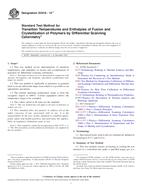Potřebujeme váš souhlas k využití jednotlivých dat, aby se vám mimo jiné mohly ukazovat informace týkající se vašich zájmů. Souhlas udělíte kliknutím na tlačítko „OK“.
ASTM D3418-12e1
Standard Test Method for Transition Temperatures and Enthalpies of Fusion and Crystallization of Polymers by Differential Scanning Calorimetry (Includes all amendments And changes 6/8/2015).
Automaticky přeložený název:
Standardní zkušební metoda pro tranzitní teploty a entalpie Fusion a krystalizace polymerů diferenční skenovací kalorimetrie
NORMA vydána dne 1.8.2012
Informace o normě:
Označení normy: ASTM D3418-12e1
Poznámka: NEPLATNÁ
Datum vydání normy: 1.8.2012
Kód zboží: NS-23583
Počet stran: 7
Přibližná hmotnost: 21 g (0.05 liber)
Země: Americká technická norma
Kategorie: Technické normy ASTM
Anotace textu normy ASTM D3418-12e1 :
Keywords:
crystallization, crystallization temperature, differential scanning calorimetry (DSC), enthalpy, first-order transition, glass transition, heat of crystallization, heat of fusion, heat of transition, melting, melting temperature, polymer, transition temperature, ICS Number Code 83.080.01 (Plastics in general)
Doplňující informace
| Significance and Use | ||||||||||||||||||
|
5.1 Thermal analysis provides a rapid method for measuring transitions due to morphological or chemical changes, in a polymer as it is heated/cooled through a specified temperature range. Change in specific heat capacity, heat flow and temperature values are determined for these transitions. Differential scanning calorimetry is used to assist in identifying specific polymers, polymer alloys, and certain polymer additives, which exhibit thermal transitions. Chemical reactions that cause or affect certain transitions have been measured with the aid of this technique; such reactions include oxidation, curing of thermosetting resins, and thermal decomposition. 5.2 This test method is useful for specification acceptance, process control, and research. |
||||||||||||||||||
| 1. Scope | ||||||||||||||||||
|
1.1 This test method covers determination of transition temperatures and enthalpies of fusion and crystallization of polymers by differential scanning calorimetry. 1.2 This test method is applicable
to polymers in granular form or to any fabricated shape from which
it is possible to cut appropriate specimens.
1.3 The normal operating temperature range is from the cryogenic region to 600°C. Certain equipment allows the temperature range to be extended. 1.4 The values stated in SI units are the standard. 1.5 This standard does not
purport to address all of the safety concerns, if any, associated
with its use. It is the responsibility of the user of this standard
to establish appropriate safety and health practices and determine
the applicability of regulatory limitations prior to use.
|
|
Standard Practice for Description of Thermal Analysis and Rheology Apparatus
|
ISO?11357-1
|
Plastics--Differential Scanning Calorimetry (DSC)--Part 1: General Principles
|
|
Standard Practice for Conducting an Interlaboratory Study to Determine the Precision of a Test Method
|
|
Standard Test Method for Temperature Calibration of Differential Scanning Calorimeters and Differential Thermal Analyzers
|
ISO?11357-2
|
Plastics--Differential Scanning Calorimetry (DSC)--Part 2: Determination of Glass Transition Temperature
|
|
Standard Terminology Relating to Thermophysical Properties (Includes all amendments and changes 10/5/2023).
|
ISO?11357-3
|
Plastics--Differential Scanning Calorimetry (DSC)--Part 3: Determination of Temperature and Enthalpy of Melting and Crystallization
|
|
Standard Terminology Relating to Thermal Analysis and Rheology (Includes all amendments and changes 10/5/2023).
|
|
Standard Practice for Heat Flow Calibration of Differential Scanning Calorimeters |
Odebírejte informace o nově vydaných normách ZDARMA:
Chcete pravidelně odebírat informace o nově vycházejících normách z celého světa a to zcela zdarma?
Přihlašte se k odběru. Vše je velice jednoduché a absolutně ZDARMA.
Na výběr máte vydavatele z celého světa.




 Cookies
Cookies
